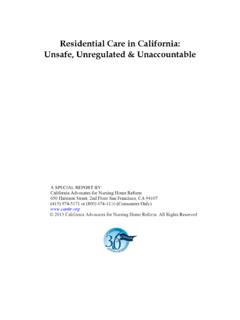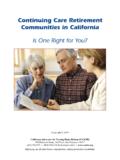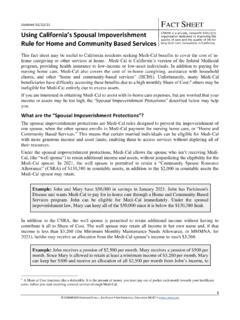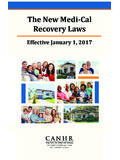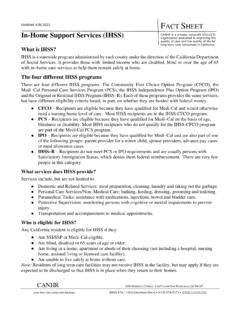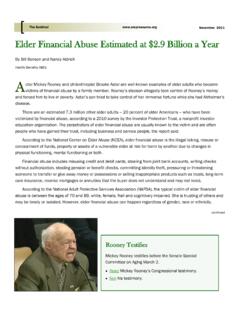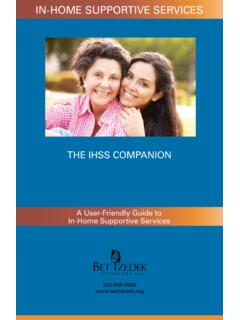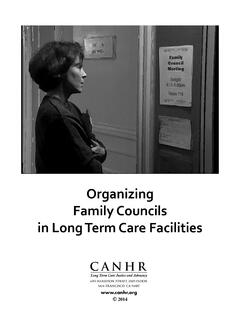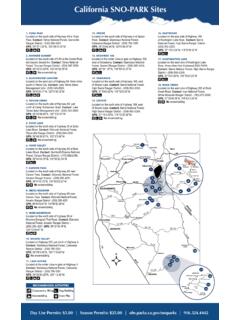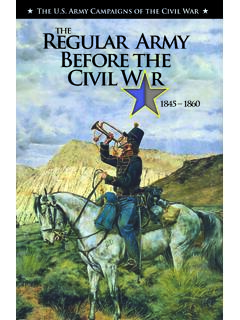Transcription of Resident Councils in Residential Care/Assisted Living
1 C A N H R 1803 6TH STREET BERKELEY, CA 94710 Long Term Care Justice and Advocacy (800) 474-1116 (CONSUMERS ONLY) (415) 974-5171 One of the best ways to improve care is to organize and participate in a Resident council. A Resident council is an organized group of residents who meet regularly to discuss and address concerns about their rights, quality of care and quality of life. Residents of Residential Care Facilities for the Elderly (RCFEs) - sometimes called Assisted Living or Board and Care - have the right to organize and participate in a Resident council. (HSC (a)(27); CCR (a)(24)) Upon the invitation of the Resident council, the Resident council can also include family members, Resident representatives, advocates, representatives of the Long Term Care Ombudsman Program, and staff.
2 Purpose of a Resident Council The primary purpose of a Resident council is for residents, as a group, to influence the quality of their care. Whatever affects the residents' lives is a proper concern of the Resident council, whether it's the role of the administrator, the day-to-day care, meals and snacks, respect for Resident rights or the activity program. An effective Resident council allows its members to meet without facility staff to share concerns, identify problems, offer solutions, provide mutual support, and to submit the council's concerns and recommendations to the administrator or designated staff liaison for action. By presenting a united voice on mutual concerns, members need not fear being isolated and threatened by retaliation, and they can address the problems of the majority of residents, rather than a few.
3 Resident Councils help prevent problems and guide members on how to assert their rights and participate in joint action to better their lives. Benefits of a Resident Council Resident Councils offer a forum to become educated about rights and how to effectively exercise rights, to serve as a sounding board for solutions to shared problems, to initiate new ideas, and to communicate with the facility administrator and staff. Facility administrator and staff should be invited to specific meetings at specific times to discuss specific concerns. For example, if one concern involves dietary issues, invite the dietician to talk to the council, answer questions and address these concerns. It's always better to have the administrator and staff on your side, whenever possible, since they are the ones who provide the care.
4 Resident council members benefit directly from sharing information, support and encouragement. By working together to solve problems, residents exercise self-determination and experience empowerment as they identify problems and explore ways to resolve their concerns at an early, preventive stage. Resident Council Rights California law sets forth the rights of Resident Councils in RCFEs, and also the obligations of facilities with regard to promoting and supporting Resident council development. (HSC ; CCR 87221) Resident council rights and facility obligations include the following: Two or more residents have the right to form a Resident council. The facility must inform new residents if a Resident council exists, including the time, dates and place for meetings and a representative of the Resident council to contact for more information.
5 If there is no Resident council, provide written information on the right to form one. Resident Councils in Residential Care/Assisted Living Updated 9/10/2021 CANHR 1803 6TH STREET BERKELEY, CALIFORNIA 94710 Facilities are required to post in prominent place information about the Resident Council and the text of this law with the heading Rights of Resident Councils . Facilities with a licensed capacity of 16 or more must designate a staff liaison who is responsible for providing assistance to the Resident council, make a room available for meetings, and post meeting information on an existing prominently placed bulletin board. The facility must respond to written requests or concerns of the Resident council within 14 days.
6 The facility must inform Resident council members of their right to be interviewed as part of the regulatory inspection process. Facilities are prohibited from willfully interfering with the formation, maintenance or promotion of a Resident council. "Willful interference" includes discrimination or retaliation for participating in a Resident council, refusal to publicize meetings or provide appropriate space for meetings, or failure to respond to written requests in a timely manner. Violation of the law can result in a citation and penalty of $250 per day. Getting Organized Organizing a Resident council can seem like a big job but it does not have to be. It is usually best to keep organizing activities simple. To get started, take these steps: Recruit two or more like-minded residents to plan and sponsor a first meeting; Meet with the administrator to make arrangements and seek cooperation; and Publicize the meeting.
7 Although the council will need to select leaders at some point, it is very common for this process to be informal at first while residents are getting to know one another better and issues and concerns are being identified and discussed. Contact CANHR to get more detailed information about planning, promoting, and running Resident Councils . The Long Term Care Ombudsman Program can also assist in organizing Resident Councils and act as a resource for issues dealing with residents rights, facility policies, and improving the quality of care and life. Communicating Concerns The Resident council must choose its issues wisely. It is unrealistic to expect all of your concerns to be dealt with at once. Identify the issues and then prioritize.
8 Select a concern or two of direct importance to most residents, or choose less serious issues first, and see how the administrator responds. The issues and/or concerns should be agreed upon at the end of each meeting, and the format and tone of conveying the message should also be agreed upon. Will the concerns be dealt with in a meeting with the administrator or designated staff liaison; will the request be in writing; or both? Generally, it is important to put your concerns and/or recommendations in writing! If you don't put it in writing, don't expect a timely response. It should be directed to the administrator or the designated staff liaison. Be concise and direct. Give examples of the problem without using residents' names.
9 Whenever possible, make recommendations or ask for specific outcomes with reasonable deadlines. Information and Support Supporting Resident and family Councils is a top CANHR priority! CANHR staff members are available to answer your questions and suggest resources. Call us at 1-800-474-1116. CANHR also offers a wealth of information on residents' rights and other important topics affecting residents in Residential Care/Assisted Living such as theft and loss, eviction protections, and refunds. Visit our website at for more information. CANHR 1803 6TH STREET BERKELEY, CALIFORNIA 94710 HSC refers to California Health and Safety Code; and CCR refers to the California Code of Regulations, Title 22, Division 6, Chapter 8: Residential Care Facilities for the Elderly.
10
